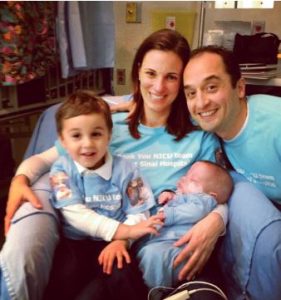
© Fabiana Bacchini
In a heart-touching testimony that emphasises the power of patient and family involvement in neonatal research, Fabiana Bacchini’s journey with her preterm-born child leads to significant insights into the care of preterm infants beyond hospital walls. Her story underscores the critical role parents play not only in their child’s immediate well-being but also in driving long-term positive outcomes for the whole neonatal community.
In her article, Fabiana Bacchini, a resilient mother of twins born at just 26 weeks’ gestation, looks back at her transformative experience within the neonatal intensive care unit (NICU) and her participation in research. Michael, one of the twins, was stillborn, and Gabriel was rushed to the NICU, where he stayed for the next 146 days. She was then given the opportunity to participate in a groundbreaking research study called Family Integrated Care (FICare). This innovative model empowers parents to actively participate in their baby’s care, be part of the NICU team, and make informed decisions about their child’s treatment journey. Her involvement during that challenging time made her feel empowered and later motivated to share her experience. Currently, she is Executive Director of the Canadian Premature Babies Foundation (CPBF)
Baccini’s reflections also capture the complex emotions accompanying the life-changing condition of preterm birth. Her son’s struggle for survival, marked by complex medical interventions and life-altering decisions, made her realise the crucial link between research and the chance at a brighter future. The power of saying “yes” to research, of allowing the medical team to innovate and parents to collaborate, resulted in improved outcomes for Baccini’s son.
With survival rates for preterm babies improving, Baccini now highlights the importance of research advances made in the field over the last decade. Yet, the challenge remains the long-term neurodevelopmental impact that often follows preterm birth. Conditions like cerebral palsy, one of her son’s diagnoses, serve as reminders of this challenge and that further research could potentially reshape a child’s physical and cognitive abilities.
Nevertheless, Gabriel’s happy, active, and “full” life with quadriplegic cerebral palsy also illustrates that intangible outcomes like love, joy, and happiness are equally important for a child’s life. Their experience as a family helps to advocate for the need to consider preterm birth beyond medical complications and as an event impacting various areas of the family’s life, even long after the NICU stay. Baccini wants to make researchers understand that parents have a profound impact on the health outcomes of preterm infants – they are the ones raising these children and dealing with health challenges for the rest of their lives. They provide financial, time, and emotional support and therefore need to have a voice in the decisions regarding their children’s care. Calling for researchers to recognise families’ crucial role, she hopes for a scenario where families are seen as integral members of a child’s healthcare team.
Baccini also believes that the perspective and input of affected families are vital for good research because, with their lived experience, they help researchers define priorities and shape questions and approaches. This transformation requires collaboration, commitment, and resources, both within the medical setting and extending to communities, schools, and workplaces. Everyone has to work together to find the best times and places for collaboration.
In essence, this narrative serves as a reminder that the challenges of preterm birth are not confined to hospital walls but extend throughout a child’s life journey and the family. Baccini’s commitment to driving change through participatory research is inspiring. As research continues to evolve, this story is a clear call to recognise the fullest potential of involving preterm patients and their families throughout each stage of the research process.
Read Fabiana’s testimony at: Nature, Pediatric Research
Full list of authors: Fabiana Bacchini

